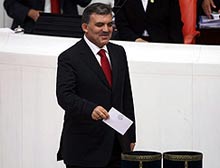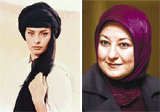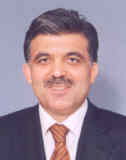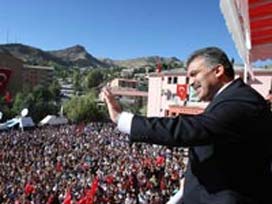Abdullah Gül Elected President

In the third tour of the presidential elections, which took place this afternoon (28.08.07), Abdullah Gül was elected the 11th president of Turkey. Contrary to the first two rounds, where a two-thirds majority was necessary, in the third ballot a simple majority of 276 or over was enough.
339 votes
There were 448 MPs present at the third ballot.
With 339 votes, Gül easily won the election. The candidate of the Nationalist Movement Party (MHP), Sabahattin Cakmakoglu, received 70 votes, and the candidate of the Democratic Left Party (DSP), Tayfun Icli, 13 votes. There were 24 empty and 2 invalid ballot papers.
Gül had received 341 votes in the first, and 337 votes in the second ballot.
The Republican People's Party (CHP) had again boycotted the elections. The pro-Kurdish Democratic Society Party (DTP) and Ufuk Uras of the Freedom and Solidarity Party (ÖDP) had announced that they would not vote for Gül.
Cabinet presented tomorrow
Prime Minister Erdogan had thanked all the MPs joining the ballot for "the support of democracy". He has announced that he will present the new government's cabinet to Gül tomorrow (29 August).
In a live broadcast on NTV television, Ufuk Uras said that the presidency had to leave the palace meaning the presidential residence, open itself towards NGOs. It was our right to expect a presidency which supported democracy, laicism and a social state governed by the rule of law.
DTP Group Leader Selahattin Demirtas said that he did not expect Gül's presidency to bring an improvement in democracy or human rights. However, the party will join Gül's oath-taking ceremony.
According to the CNN Türk website, Abdullah Gül's wife, Hayrünisa Gül, will not be attending the ceremony.
After taking the oath this evening, Gül is set to take over from current President Ahmet Nejdet Sezer at a private ceremony at 7.30 pm.
Who is Abdullah Gül?
Born in Kayseri, central Anatolia, in 1950, he graduated from Istanbul University in economics in 1971. He received his doctorate from the same university in 1983. He has joined Masters and doctoral programmes in Exeter and London.
From 1980 to 1983 he worked on the foundation of the industrial engineering faculty at Sakarya University and lectured there.
From 1983 to 1991 he worked as an economic expert for the Jeddah Islam Development Bank.
In 1991 he became associate professor in international economics. In the same year, he became the vice chairperson of the Welfare Party responsible for foreign affairs.
In 1995 he was reelected MP in Kayseri for the Welfare Party and continued his duty in the commission for foreign affairs.
From 1996 to 1997 he was a state minister and government speaker. He was elected into parliament again in 1999, this time as an MP for the Virtue Party.
From 1992 to 2001 he was a member of the Parliamentary Assembly of the Council of Europe. He worked in the councils for culture, regulations, and political and economic development. He earned the "Pro-merito" medal and perpetual honorary membership of the council for his work.
In 2001, he was a founding member of the AKP. He has taken on the duties of party vice chairperson responsible for political and legal questions and the membership in the NATO Parliamentary Assembly.
On 16 November, he became Prime Minister. He then left that position to Erdogan and became Minister of Foreign Affairs and Deputy Prime Minister on 14 March 2003.
He is married and has three children. (TK/NZ/AG)







